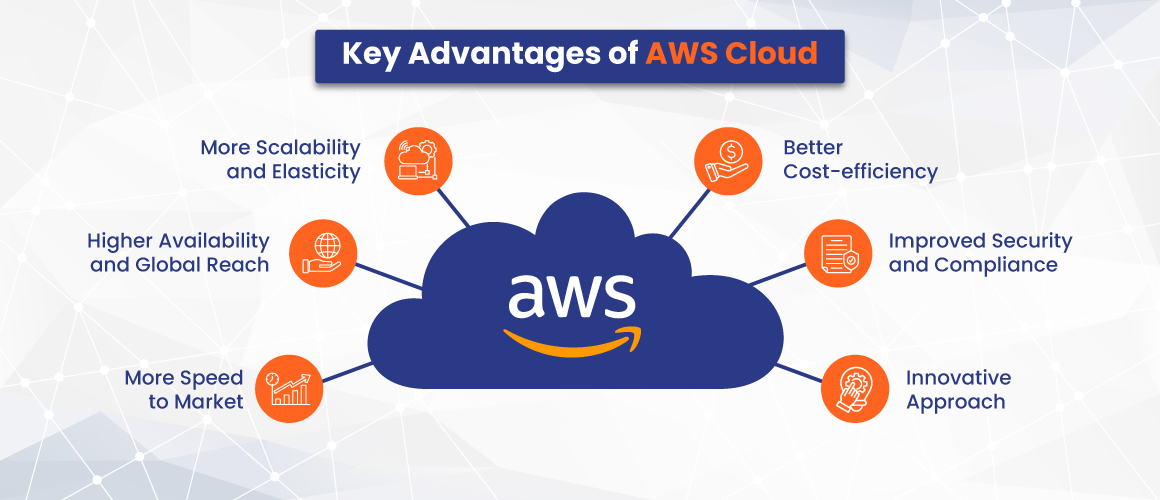Cloud technology has emerged as a pillar of digital transformation for modern enterprises. Unparalleled flexibility, scalability, and accessibility make it one of the most sought-after technologies in the corporate world. Visionary entrepreneurs focus on the cloud to leverage the benefits of analytics and intelligence by migrating corporate data. Here, AWS database migration services lend a helping hand.
This post talks about the top benefits and other related details of AWS Cloud solutions. We will also dig deep into its industry-specific solutions from the perspective of an AWS cloud consulting services provider. Let’s start with the basics of AWS Cloud.
Brief History of AWS
It starts in the early 2000s when Amazon Web Services (AWS) started handling the highly complex eCommerce infrastructure of Amazon.com. As an internal project, AWS has played its role effectively, and realizing its potential, Amazon decided to make it a global service. Internal web services within Amazon were initiated in 2002, whereas its public launch as a scalable infrastructure was in 2006.
Amazon began with Amazon Simple Storage Service (S3) in March 2006 to offer a scalable storage facility. The company introduced Amazon Elastic Compute Cloud (EC2) in August 2006 to offer on-demand virtual computing resources. These were foundational services and made AWS capable of becoming a leading cloud provider. In a short time after launching EC2, AWS gained fame as a robust cloud solution.
What are Core AWS Services and Capabilities?
AWS offers an array of services, but its key capabilities are offering foundational cloud infrastructure and useful tools for building applications. Broadly, we can classify core AWS services in five categories-
Compute
It is a core service that enables users to run virtual servers (Amazon EC2) and execute code without managing servers (AWS Lambda).
Storage
It offers highly scalable and cost-effective storage options for different data types. Its types include Amazon S3 for object storage and Amazon EBS for block storage for virtual machines.
Databases
AWS has a wide collection of purpose-built databases, including relational databases (Amazon RDS and NoSQL databases (Amazon DynamoDB).
Networking
It includes services for making isolated virtual networks (Amazon VPC) and managing DNS (Amazon Route 53). Amazon CloudFront is useful to deliver content with low latency.
Security and Compliance
AWS Cloud is highly secure and manages user access with permissions effectively using AWS IAM. It also offers data encryption and other features to address compatibility.
It is beneficial to contact an AWS consulting services provider with a proven track record of implementing AWS solutions across different industry sectors.
Key Advantages of AWS Cloud

AWS Cloud offers many benefits to modern companies and enables them to simplify the complexities of the digital era. Higher agility, efficiency, and an innovative approach are some of the useful benefits of AWS cloud solutions. Let’s go through the top benefits of AWS Cloud-
More Scalability and Elasticity
AWS Cloud solutions assist modern enterprises in facing fluctuating demands by providing unparalleled scalability and elasticity. Whether it is a sudden spike in website traffic or a seasonal offer, AWS can adjust computing power and storage automatically.
Better Cost-efficiency
The ‘pay-as-you-go’ model of AWS can eliminate the requirement of investing a large amount in hardware and data centers. Companies only pay for resources they consume that lead to cost savings over the period. Moreover, AWS brings automation to save time and operational costs.
Higher Availability and Global Reach
AWS has a huge global infrastructure across different regions and Availability Zones. It enables enterprises to deploy applications easily while minimizing latency and improving user experience. Global reach can also enhance reliability and business continuity.
More Speed to Market
As AWS increases agility, developers can experiment, build, and deploy new applications and services quickly. Moreover, AWS can improve the innovation cycle to increase the speed-to-market for remaining competitive.
Improved Security and Compliance
High priority on security and compliance makes AWS Cloud a preferred solution for the corporate sector. It offers numerous services and features with excellent data protection, identity and access management security to meet global security standards like ISO and GDPR.
Innovative Approach
AWS assists companies in getting rid of managing physical data centers and infrastructure maintenance. As a result, the IT staff can focus on strategic initiatives and innovative solutions for their routine activities.
A reputable AWS migration services provider can assist your company in gaining these advantages cost-effectively. Let’s go through the scope of Amazon AWS in driving digital transformation.
Industries Thriving on AWS
AWS Cloud solutions empower various industries across different sectors by streamlining their operations and promoting innovation. Though all sectors can leverage the advantage of AWS Cloud, financial services, healthcare and life sciences, retail and e-commerce, and manufacturing are some of the key beneficiaries. Apart from these sectors, the gaming, education, media, and automotive sectors can also gain from AWS Cloud solutions.
AWS Industry-Specific Solutions
One of the biggest business advantages of AWS is it offers industry-specific solutions to meet their unique opportunities. Let’s go through some use cases for different industry sectors-
Financial Services
AWS gives a secure and compliant environment for this highly regulated sector. Financial institutions and banks can use AWS Cloud to modernize their legacy systems and run core banking applications. They can also use these solutions for fraud detection using AI and ML technologies while adhering to standards like PCI-DSS and GDPR.
Healthcare & Life Sciences
This is another most regulated sector that needs to adhere to regulations like HIPAA and GxP. AWS facilitates this sector in managing EHRs and enabling telemedicine with virtual care solutions. Purpose-built services like AWS HealthLake can enable hospitals to store, analyze, and transfer complex health data effectively.
Retail & E-Commerce
Whether it is handling fluctuating customer traffic or managing seasonal rush, AWS enables the thriving retail and eCommerce sector to manage every situation. EC2 Auto Scaling can offer excellent scalability, and DynamoDB can manage vast product catalogs using AWS. Amazon Personalize is useful for delivering personalized shopping experiences.
Manufacturing
This sector can use AWS for implementing Industry 4.0 initiatives and connecting IoT devices using AWS IoT Core. AWS also offers real-time data analytics for optimizing production lines and implementing predictive maintenance for equipment. Furthermore, AWS plays a vital role in improving supply chain visibility and efficiency.
AWS consulting services assist in gaining the advantage of industry-specific solutions based on your company’s business requirements and other aspects.
Is AWS the Right Cloud for Your Business?
You need to consider several factors to determine whether AWS is the right cloud for your business. Though it provides modern enterprises with comprehensive offerings, it is better to contact a renowned AWS database migration services provider to get a clear idea. Startups and SMBs can opt for a pay-as-you-go model to save big on price and get high scalability. Large enterprises can gain the benefits of a vast and deep service portfolio of AWS.
Every business has unique requirements. Therefore, it is better to consider them with other factors when selecting the most suitable cloud solution for your company.
Cloud Migration Essentials with AWS
Proper assessment and planning are the first phases for ensuring an effective integration of AWS Cloud solutions into your company. You need to make a detailed migration strategy using the 7 Rs- Relocate, Rehost, Replatform, Repurchase, Refactor, Retain, and Retire. You can get assistance from AWS migration services for making and executing this strategy. The next step is to set up a secure and scalable AWS environment.
Other essential factors are testing and validation of AWS solutions at every stage, and ensuring ongoing optimization. All these aspects will help you get an effective AWS Cloud integration into your business system.
Concluding Remarks
Industry-specific cloud solutions from AWS bring transformational changes in various companies, irrespective of their size. AWS Cloud can increase scalability and agility while saving a lot of time, resources, and costs. However, it is imperative to consider various factors, including business needs and growth objectives, while choosing the right cloud platform. Hope this guide will help you make a decision to take your company to the next level using AWS.
Silver Touch Technologies USA is a leading provider of AWS cloud consulting services. Our in-house team of certified AWS professionals helps you gain the advantage of robust AWS cloud solutions. Let’s connect to know the scope of AWS Cloud and give your company a competitive edge by implementing high-quality solutions.



